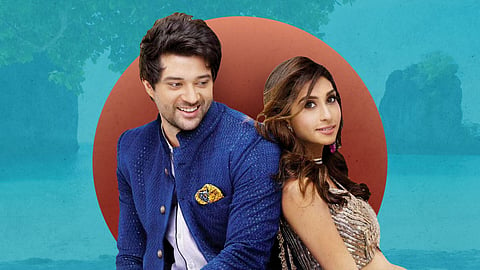
- Reviews
- Power List 2024
- Cannes 2024
- In-Depth Stories
- Web Stories
- News
- FC Lists
- Interviews
- Features
- FC SpecialsFC Specials

Director: Avnish S. Barjatya
Writers: Manu Sharma, Avnish S. Barjatya
Cast: Rajveer Deol, Paloma Dhillon, Aditya Nanda, Kanikka Kapur, Rohan Khurana
Duration: 156 mins
Available in: Theatres
A failed start-up bro reaches the destination wedding of the woman who cheated on him years ago. It’s in Thailand; he becomes a rampant sex tourist. When he’s not wasted, he hooks up with the groom’s best friend’s ex. Freshly sober, she’s been on a toxic dating-app binge. He becomes her rebound from hell. Together, they turn the wedding into a playground of debauchery. A guest dies, a hotel is burnt, a sex tape goes viral, but the two become sordid soulmates. She convinces him to join her rehabilitation center, and they live crappily ever after. Their story is called Dono.
Just kidding. Dono is not that film. But it is – at least spiritually – a Rajshri Productions version of that film. The directorial debut of Avnish S. Barjatya (son of Sooraj Barjatya) is as ‘modern’ as a Barjatya title can be. There is a destination wedding in Thailand, but it looks like an exotic Rajasthan-tourism advert. There is a failing start-up bro named Dev, but he’s at the wedding of the friend he’s always loved. There is a groom’s best friend’s ex named Meghna, but Dev and Meghna don’t hook up; they guide each other through heartbreak and, on the way, grow some (virginal) feelings. There is debauchery at the wedding, but it’s only a cocktail party planned by rich 20-somethings who don’t smoke. There’s no sex tape, but there’s a viral video of the bride and groom ‘caught’ in a liplock. There’s no death or rehab, but there’s something bolder in terms of the Rajshri Cinematic Universe: An almost-French kiss at the altar. This is met by an almighty gasp, by the kind of elderly guests who probably grew up quoting Hum Saath-Saath Hain (1999) at family picnics.
Which is to say, I like the intent of Dono. It uses the old-school Barjatya setup – a big fat (arranged) wedding, traditional families, respectful kids, songs and songs, silly cricket matches, endless ceremonies and lehengas – to deliver new-gen statements. Meghna was dating someone for six years. Workaholic Dev meets his parents after three years. A bride-to-be sneaks out of a temple for a lavish beach proposal. When she gets cold feet, it’s because she can’t fathom life in a joint-family mansion where everyone has an opinion on how she lives. In a way, it’s almost a thinly veiled update of Hum Aapke Hain Koun..! (1994). The groom’s brother and bride’s sister who aren’t supposed to fall for one another are now the groom’s friend and bride’s one-sided flame who aren’t ready to fall for one another. Vintage blood bonds are replaced by life bonds. It’s not family dynamics so much as romantic and existential baggage that keeps them apart. Dev and Meghna have to love themselves first; there’s no external pressure.
But intent is only 10% of the battle. The other 90% revolves around execution, craft, and one simple question: Is the film decent? The simple answer is no. If one strips Dono of its Rajshri heritage, it’s a long and bloated foreign holiday parading as a pretty launch vehicle. The staging lacks depth, the narrative is indulgent and unfocused, and the lead characters are short on chemistry. Rajveer Deol has great bed-hair and a wonderful movie face – those eyes have a lot of his dashing grandpa Dharmendra – but the acting and diction need life experience. Ditto for Paloma Dhillon; both of them struggle to convey their characters’ jaded outlook. The breezy title song aside, the Shankar-Ehsaan-Loy soundtrack is forgettable. When the film takes a breather from its colour-coordinated events, Dev and Meghna’s unnecessary flashbacks expand the runtime. The supporting cast is functional, but also a victim of the film’s dated emotional aesthetic.
Even with context, however, Dono lacks the narrative maturity to be an adult. Heritage intact, the movie believes it’s progressive and grown-up. But its conflicts are derived from stories, not life. Its drama is not raw but sheltered. For instance, Dev flies to the wedding for “closure,” a term he learns from an agony-aunt program called…The Miss Malhotra Show? There’s a pre-interval outburst that not only imitates the Bollywood-manchild handbook, it also makes no difference to the story. Post-interval, it’s like nothing ever happened. The characters just take up from where they left off, after a cutesy apology. The scene exists solely to remind viewers that Dono is not a chip off the old block. Never mind that the gist of it is that a lovelorn Dev gets appalled about Meghna being cool with her ex. The old-fashioned gentleman in him wants to see her suffer. It’s only when she does break (courtesy a cringe moment in a taxi) – and when his rant is validated – Dev and Meghna truly hit it off. Old habits die hard, I suppose.
Towards the end, the film focuses so much on the wedding that an unsuspecting viewer would never be able to tell who the real protagonists are. When the camera finally remembers Dev and Meghna, it feels like a footnote. The sex tourist and the alcoholic are on their best behavior. The dating apps are deleted. The Thailand romp is over. The fling is reduced to a pure-veg situationship. And Dono becomes slang for Do-No-More.